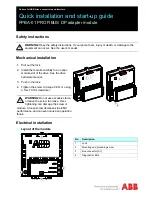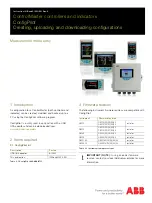
6
Installation by Wire
Installation by Wire
NOTE: Must install wires listed on this page for regulator to operate.
Install BLACK Ground Wire
The BLACK Ground Wire #1 in diagram at right is included in the four-wire Ford-style plug on the wiring
harness and is factory installed on regulator packages designated with “H” at the end of the model
number. The other end of the Ground Wire is fitted with a ring terminal connector. In some applications,
this wire can be connected directly to the alternator’s ground terminal post. For best accuracy ground
as close to the battery as possible, especially when charging lithium batteries.
Both the alternator and
regulator must be connected to system ground.
Install RED Power Wire
The RED Power Wire #2 in diagram at right is included in the four-wire Ford style plug and is factory
installed on regulator packages designated with “H” at the end of the model number. The other end of
the Power Wire is fitted with a ring terminal connector. In most applications, this wire can be connected
directly to the alternator’s positive output post. When a diode-type battery isolator is used, the power
and voltage sense (#9) wires must be connected to the battery side of the battery isolator. The
Power Wire is equipped with 15-amp ATC type fuse. The Power Wire must be fused to ensure against
damage to the voltage regulator.
Install BROWN Ignition Wire
The BROWN Ignition Wire #3 in diagram at right provides ON/OFF voltage for the regulator. This wire is
included in the Ford-style plug at the regulator end of the wiring harness. The other end of the wire is fitted with a butt connector.
Typically, the ignition wire is connected to the ON side of the ignition switch. This may be at the actual switch, or to a wire in the
existing engine wiring loom that delivers switched voltage from the ignition switch. In some cases, an oil pressure switch may
be used to activate the regulator. In either case, the regulator’s ignition wire must see zero volts when the engine ignition is
switched off.
Install BLUE Field Wire
The BLUE Field Wire #4 in diagram at right provides regulated current to control alternator output. The wire is included in the
wiring harness’ Ford-style plug and is preconnected at the regulator. At the other end of the wire, you’ll find either a plug or a ring
terminal, depending on the alternator’s field terminal connection. Attach the field wire to the alternator’s field terminal.
Install Alternator Temperature Sensor
The optional Alternator Temperature Sensors (MC-TS-A or MC-TS-A80) allows your MC-618 voltage regulator to monitor
your alternator temperatures and limit output if safe operating levels are exceeded. The MC-618 uses active temperature
regulation to maximize high-temperature output. The sensor includes a 54” (MC-TS-A) or 80”
(MC-TS-A80) cable, a sensing attachment lug, and positive and negative regulator plug-in
connectors. To install the either sensor:
1.
Connect the sensor lug to one of the four bolts that hold the alternator’s front and rear
cases together. If a Balmar alternator is installed use the predrilled location provided on
the rear case. Extend sensor cable to the regulator. The cable can be included within the
regulator’s wiring harness, or can be run alongside the harness and attached with cable
ties.
2.
Connect the temperature sensor to the Alt. Temp. terminals on the regulator.
It is essential that the terminals are connected
to the correct pin. Connect the red wire to the positive terminal #6 and the black wire to the negative terminal #5.
Install Positive Sense Wire
Included with the MC-618 wiring harness kit is a fused wiring pigtail which features a ring terminal at one end and a butt
connector at the other. In the center is an ATC-type fuse and fuse holder. This wire MUST be connected at the (#9) Positive
Battery Sense Terminal. A female quick connect plug has been pre-attached on the terminal (#9) pin. To complete installation of
the sense circuit:
1.
Identify the favored location for battery sensing.
NOTE: The voltage sense wire MUST be installed on the alternator side of any disconnect device. If a
disconnect on the positive output cable of the alternator occurs -- such as a fuse blowing or a disconnect
switch -- the sense wire must read the alternator output voltage and not the battery voltage. If the
alternator is disconnected from the battery and the regulator is sensing the battery voltage, it will continue
to output power, likely causing alternator damage.
This is not covered under warranty.
2.
Attach the included wiring pigtail with 10-amp fuse to a length of wire of sufficient
length to reach the desired sensing loca-
tion. If the length of the wire
between the regulator and the sensing location is 8’ or less, a 16-gauge wire is satisfactory. If
the wire exceeds 8’, increase the wire size to 14 gauge.
3.
Remove the female 1/4” spade terminal from the terminal (#9) pin. Crimp the spade terminal to the sense wire and
reconnect the spade to the (#9) pin.
Magnetic
Reed Switch
17
16
15
14
13
12
11
10
9
8
7
6
5
1
2
3
4
Magnetic
Reed Switch
17
16
15
14
13
12
11
10
9
8
7
6
5
1
2
3
4







































